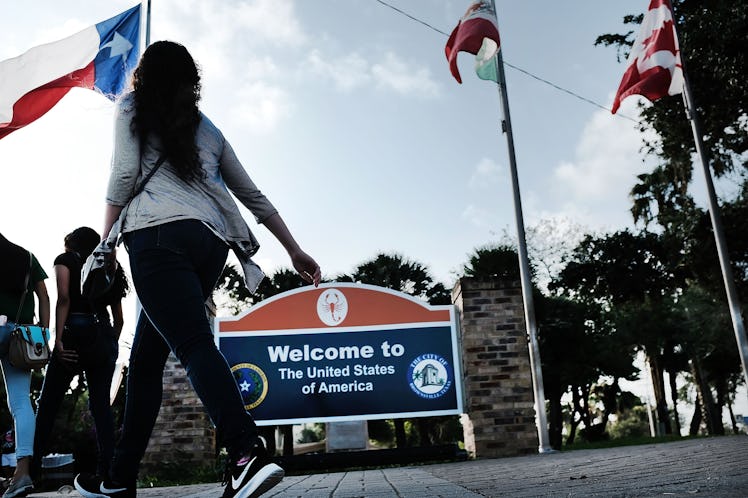
A Judge Defied The Trump Admin & Ordered Families Separated At The Border To Be Reunited
Under a Trump administration "zero tolerance" policy that has rattled the nation, the U.S. government has been detaining illegal immigrants and breaking up families regardless of whether they are first-time offenders, asylum-seekers, or parents with small children at the Mexico border. President Donald Trump signed an executive order on June 20 to attempt to reduce family separations, but without addressing the administration's "zero tolerance" policy the practice would likely continue. But on Tuesday, a judge ordered families separated at the border to be reunited, in a move that has been considered a direct rebuke of the Trump administration.
The decision came late on Tuesday, June 26, from U.S. District Court Judge Dana Sabraw in California and includes specific language about how the government must handle families at the the border, per CNN. The court order doesn't direct officials to stop prosecuting those who cross the border illegally, but it seemed to address the biggest grievances about ensuring humane treatment of immigrants.
"Plaintiffs have demonstrated a likelihood of success on the merits, irreparable harm, and that the balance of equities and the public interest weigh in their favor, thus warranting issuance of a preliminary injunction," Sabraw wrote in his decision, which was also obtained by Politico.
The order requires federal officials to stop detaining parents separately from their minor children, unless the parent is unfit or the parent declines reunification. It also specifies a specific time period of 14 days within which all parents must be reunited with their minor children who are under the age of 5 (a 30-day period is given to parents with minor children older than 5). The order also mandates that officials provide parents contact with their children by phone within 10 days.
The American Civil Liberties Union (ACLU) originally filed the case against the Trump administration in February on behalf of a Congolese woman seeking asylum in the U.S. who was separated from her 7-year-old daughter, CNN reported, but the group of plaintiffs has since grown. Additionally, 17 attorneys general filed suit against the Trump administration on Tuesday, June 26, to end the practice of family separation, per CBS.
"This ruling is an enormous victory for parents and children who thought they may never see each other again. Tears will be flowing in detention centers across the country when the families learn they will be reunited," said Lee Gelernt, the deputy director of the ACLU's Immigrants' Rights Project, who argued the case, per CNN.
Sabraw went even further in her decision, explicitly criticizing the Trump administration's rollout of "zero tolerance." He wrote in his decision,
The practice of separating these families was implemented without any effective system or procedure for (1) tracking the children after they were separated from their parents, (2) enabling communication between the parents and their children after separation, and (3) reuniting the parents and children after the parents are returned to immigration custody following completion of their criminal sentence. This is a startling reality.
The battle to keep families together is far from over, however. Justice Sabraw issued what is known as a preliminary injunction. It's a temporary court order that is typically granted before or during a trial to preserve the status quo until an official decision is made in the case. According to the Legal Information Institute, when determining whether to grant preliminary injunctions, judges consider "the extent of the irreparable harm, each party's likelihood of prevailing at trial, and any other public or private interests implicated by the injunction." The judge's decision on whether to award a preliminary injunction can also be appealed.
Beyond this, even Trump's executive order may have came too late. There have been many documented stories of even legal asylum-seekers being split from their young children, including the story of a woman named Angelica whose story was documented in a segment on PBS Newshour on June 20. Reporter Amna Nawaz later revealed on Twitter that Angelica had been separated from her granddaughter, Sofi, because she was not her birth mother.
The Department of Homeland Security said in a June 23 fact sheet that there was a "process established" for reuniting families, but that process was specific to "ensure that those adults who are subject to removal are reunited with their children for the purposes of removal" (i.e. to reunited children with adults who have been ordered to leave the country in order for them both to leave the country). As of June 23, the fact sheet states, 522 children had been reunited with that process. 2,053 children separated from their families were still under government care as of June 20, per the fact sheet.

The uptick in family separations and detainees in general has been putting the Trump administration on the defensive for the last several weeks, as stories like Angelica's instill fear and anger. From the perspective of the Trump administration, the reaction to the court order on Tuesday is the same as the reaction to the border crisis — it's Congress' fault, not Trump's.
A Justice Department spokesperson told CNN Tuesday that the decision "makes it even more imperative that Congress finally act to give federal law enforcement the ability to simultaneously enforce the law and keep families together." Without action by Congress — not by the Executive Branch — the spokesperson said that "lawlessness at the border will continue."
For many people, sadly, the damage is already done. There is not a clear system or process in place to reunite families, but at least federal officials are intervening.